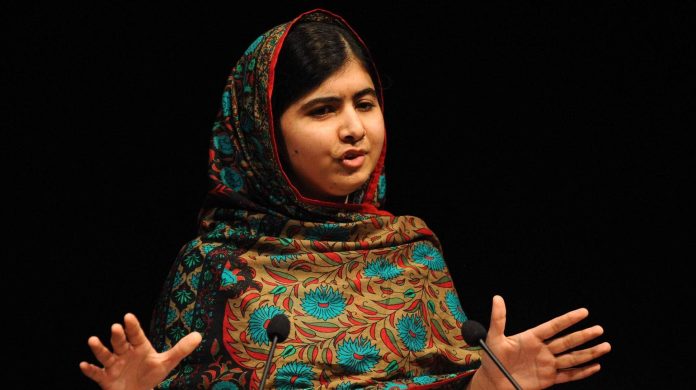ISLAMABAD: Twenty-year-old Nobel peace prize winner Malala Yousafzai, in the last month surprise trip to homeland further raised her profile, politically and philanthropically, amid a low-profile but ongoing debate around her symbol-making with the help of west.
Mingora (Swat) based Malala, who returned to Pakistan first time after she was shot in the head by militant group Tehreek-i-Taliban Pakistan gunmen for advocating education for girls, in October 2012, broke into tears while expressing her happiness to visit her homeland. Following the attack, she was sent to United Kingdom for treatment, where she is settled with her family at the moment.
“It is hard to believe,” she said briefly addressing a ceremony in her honour at Prime Minister’s House on March 29. Earlier, she called on PM with her family. “I am just 20 and I have seen so much in my life,” she said with tears, adding, “I never wanted to leave my country.” PM Shahid Khaqan Abbasi said Malala was Pakistan’s daughter who earned fame and made people of Pakistan proud.
Malala reached Islamabad in a late-night flight and directly went to a local hotel amid tight security where she spent her most of the time and conducted various meetings. She visited Pakistan with her parents, two brothers and some officials of Malala Foundation. Her visit was pre-planned but kept secret.
Many people think that her visit to Pakistan was not possible without help of security establishment. They think her visit can be part of “Bajwa doctrine” to promote a soft image of Pakistan with her help and also to raise her political profile in the country after earning fame. Some years back in an interview, showing her political leaning, Malala expressed her aim to become prime minister of Pakistan too. While, many think she would continue to raise her stature as a philanthropist with the help of international donors.
Miraculously survived Malala, who was just 14 at the time of attack on her, has emerged as a great symbol of resistance to extremist thinking, women empowerment and rights after this tragedy. However, extremists and rightist elements in her own country – Pakistan – term her development as part of ‘west’s agenda’.
Malala expressing a longing for her homeland, said, “On this day, I cherish fond memories of home, of playing cricket on rooftops and singing the national anthem in school. Happy Pakistan Day!” she wrote on March 23.
“Welcome home @Malala! Keep making us proud,” young chairperson of Pakistan Peoples’ Party said in his tweet. “Welcome home @Malala. May this be the first of many visits home. And we look forward to the day you return to us permanently,” rights activist Ali Dayan Hasan said.
On the other side, the campaign against Malala went on after her return to Pakistan. Zaid Hamid, a fanaticIslamist, also led this campaign saying that Malala represents “a conspiracy to undermine Pakistan and Islam.” He also alleges that Malala’s initial school diaries, published by BBC, were “fake.”
“Malala does not represent ordinary women of the country. She is playing in the hands of the west. How a teenager can write a book about Pakistan this way,” Fatima Haq, a housewife believes saying, “She is being imposed on us through an agenda. She actually does not what are the issues of women in Pakistan, she said.
In a similar move, a handful activists from Jamaat-ul-Dawah (JuD), extremist Islamist group led by Hafiz Saeed, called for release of Aafia Siddiqui, a Pakistani doctor who supported Al-Qaeda and attacked US personnel and is facing 86 years imprisonment in America. They held protest on the day of Malala’s speech at the PM House on March 29. “If Malala can become daughter of Pakistan and its rulers why Aafia cannot,” the organization demanded urging the rulers to take steps for her release.
A Lahore-based private school owner Kashif Mirza, who launched a rebuttal to Malala’s book “I am Malala” in his thinly-attended campaign urged young girls not to idealize Malala as their role model. He observed “I am not Malala day” in his school and campaigned on social media to criticize Malala. Mirza wrote “I am not Malala, I am a Muslim, I am a Pakistani” soon after she launched her book.
“The real reason why Malala’s image and personality are being attacked is that there is a battle of ideas between those who want Pakistan to be a theocratic state and those who want it to be a liberal, democratic, or a socialist state,” Lahore rights activist and singer Dr. Taimur Rahman, who promotes progressive thinking and teacher at Lahore University of Management Sciences (LUMS) said.
He said earlier these elements used to say Malala would never return to Pakistan and now when she has come they are politically attacking her. “Malala never said anything controversial about Islam, Pakistan and its army but only Taliban,” he said, adding, “The real pain for these Islamist extremist groups is that they are afraid of her popularity, convincing power and her progressive views and that is why they are victimizing her.” They are afraid that if she became politically strong her popularity would damage their rightist ideology, he concluded.
Malala shared Nobel Peace Prize in 2014 with Kailash Satyarthi, a prominent rights senior activist in India for (their) “struggle against the suppression of children and young people and for the right of all children to education.” In 2013, she managed to create Malala fund with the help of global development partners to promote girls’ education across the world.




